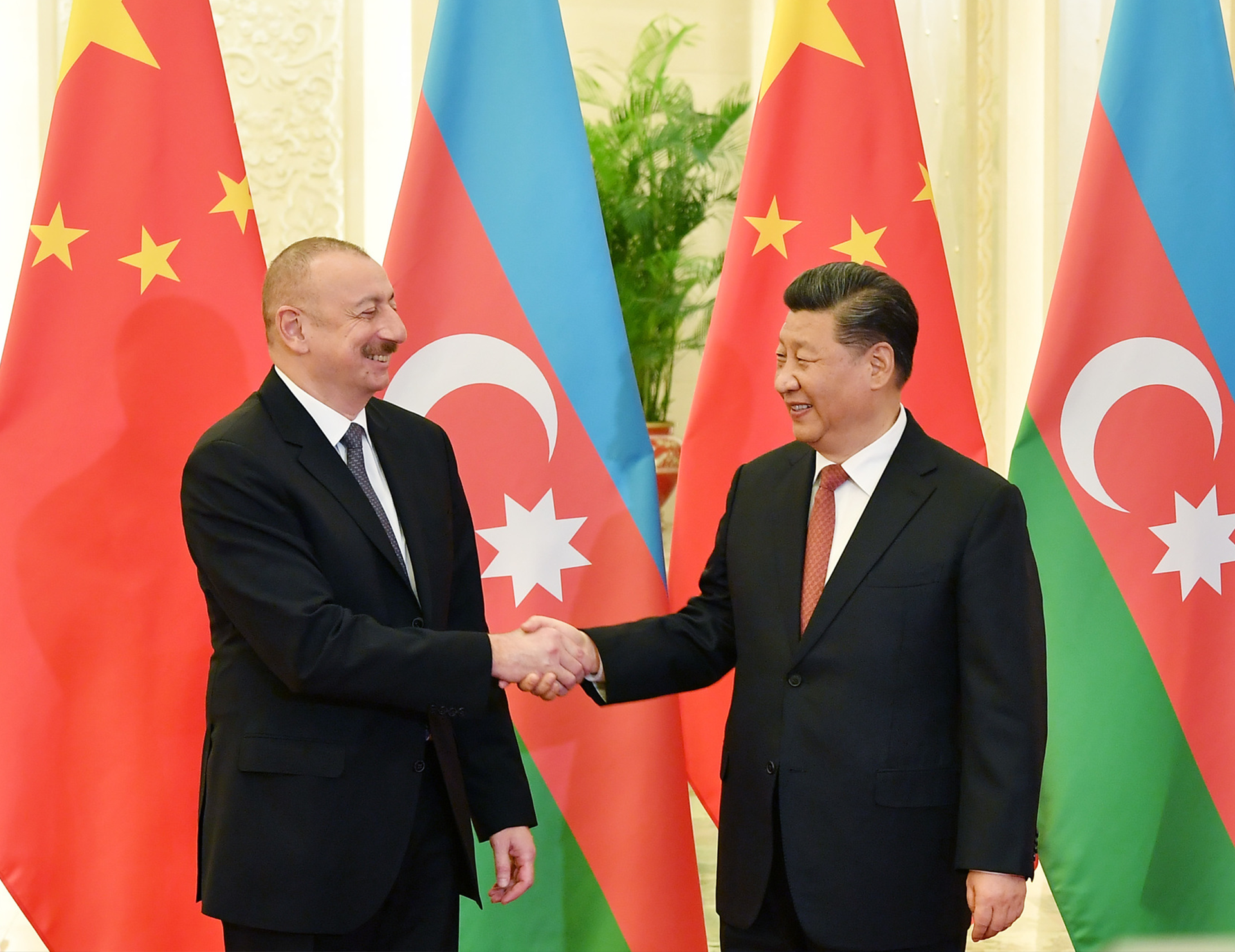China moment in Azerbaijan’s foreign policy?

Against the backdrop of recent geopolitical changes in the wider neighborhood, especially the ongoing war in Ukraine and the Israel-Hamas war, Azerbaijani foreign policy has been undergoing several shifts. Baku’s military takeover of Karabakh in September 2023 and ensuing Western support to Armenia in economic and political realms caused friction in Azerbaijan’s ties with the West, weakening one of the strongest pillars of its balanced foreign policy since independence. Yet, Baku is adamant in leveraging its pivotal location on Eurasia’s energy and connectivity map to strengthen ties with major power centers in the West while diversifying its foreign policy with closer partnerships with non-Western power poles in the Middle East and Asia.
Recent shifts in the Azerbaijani government’s narratives about the partnership with China show Baku might be interested in a stronger Chinese vector in its foreign policy. In a recent interview with China’s CGTN media outlet, the Assistant to Azerbaijan’s President Hikmat Hajiyev said Azerbaijan would like to upgrade its partnership and cooperation with China to a “qualitatively new level, to a strategic partnership”. China has already signed a similar agreement with Georgia in July 2023, showing Beijing’s interest in improving its position in the South Caucasus against the backdrop of Russia’s declining regional posture.
With a pivot to deeper ties with China, Baku aims for stronger partnership in political, economic, and geopolitical spheres. Politically, Azerbaijan has long sought greater coordination with China in supporting the principle of territorial integrity at the global level. At the same time, Baku wants bigger Chinese support for the new regional status quo it successfully forged after the Second Karabakh War. Azerbaijani leadership repeatedly expresses a strong commitment to one-China policy. In an interview with CGTN in January 2023, President Ilham Aliyev said Azerbaijan and China “always supported each other’s territorial integrity and sovereignty, and established a very strong political platform”.
Although China’s endorsement of Azerbaijani sovereignty over Karabakh has not been as clear cut as that of Azerbaijani support for the one-China policy, Baku appreciates Beijing’s measured and law-based approach to the issue compared to the biased attitude of some Western partners. After restoring its full control over Karabakh, Azerbaijani leadership invited foreign companies including Chinese ones to invest in the reconstruction process. China’s telecommunications giant Huawei has so far been key to developing smart village projects in the liberated territories. Azerbaijan views foreign investments of this type in Karabakh not only as a financial contribution to the region’s recovery but also as political support to its legitimate claims to the territory.
Baku also sees huge potential in larger economic ties with China whether to further diversify its economic partners or to decrease its dependence on the oil and gas sector by increasing the share of the non-oil products in its total trade turnover. In 2023, the Azerbaijan-China trade grew by 47.5%, amounting to 2.5 billion USD. Most notably, China overtook Turkey as Azerbaijan’s second-largest import partner. Although bilateral trade is highly asymmetric in China’s favor, Azerbaijan seeks new agreements with Beijing to ease its access to China’s large market.
For a long time, the Middle Corridor multimodal transport project that links China to European markets through Central Asia and the South Caucasus has been at the center of discussions on economic cooperation between Baku and Beijing. After Russia’s invasion of Ukraine paralyzed regional supply chains, China now seems invested in the further development of this route to diversify supply routes to Europe and expand its economic outreach to Central Asia and further to the South Caucasus and the Black Sea. In May 2023, Chinese President Xi Jinping openly endorsed the Middle Corridor in the first-ever high-level China-Central Asia summit in Xian since Beijing established the C+C5 platform in 2020, opening the door to bigger Chinese involvement in the project. In his meeting with Xi Jinping in September 2022 in Samarkand, President Aliyev said they agreed with his Chinese counterpart on benefiting from “excellent prospects for cooperation and partnership within the Middle Corridor and One Belt and One Road initiative”. Baku seeks to replicate the recent Kazakhstan-China agreement on the development of the Middle Corridor with a possible upgrade to a trilateral format soon.
With the elevation of climate change to the top policy level in the context of the COP29 event to be held in Baku in November 2024 and Azerbaijan’s claim to regional leadership in renewable production, however, Azerbaijan-China discussions have recently shifted to the comprehensive partnership on green energy production and green technologies. In the Third Belt and Road Forum held in Beijing in October 2023, Azerbaijan was represented by Energy Minister Parviz Shahbazov who signed several agreements on renewable energy cooperation. The Memorandum of Understanding signed between Azerbaijan’s Energy Ministry and China’s National Energy Administration envisages “exchange of experience in the field of renewable energy sources”. Chinese companies are already present in Azerbaijan’s renewable production. China-based Dongfang is participating in the construction of the 230 MW Garadagh solar power plant and the modernization of the largest power plant in Azerbaijan. China Gezhouba Group Overseas Investment develops renewable energy projects with 2 GW capacity, including green hydrogen production. According to Hikmat Hajiyev, the recent greening drive in Nakhchivan’s electricity generation has also highly benefited from the increasing use of Chinese green technologies.
Amid the growing securitization of China’s green technology exports in the U.S. and the EU, Azerbaijan and China are also eyeing a partnership on electric vehicle (EV) production. Chinese automobile exports to Azerbaijan have increased exponentially in recent years. In the COP29 and green vision forum on April 23, President Aliyev said China is Azerbaijan’s major partner in the development of the country's indigenous EV market. BYD, China’s electric vehicle giant will soon start manufacturing electric buses in Sumgayit. The crux of the issue is Azerbaijan’s plan is not only to import these vehicles from China or bring their parts and assemble them as some other foreign car companies are currently doing in the country but also to establish a manufacturing base with a real contribution to the local economy. Baku follows the same rationale for the development of the Middle Corridor. Accordingly, the growing importance of the route should not be seen only in light of larger transit revenues but also as a strategic opportunity to anchor Baku to global value and supply chains.
Although economic opportunities have been essential to Azerbaijan’s recent warming to China, Baku also sees geopolitical advantages in closer ties with Beijing. The widening rift between China and the West in the context of the ongoing war in Ukraine, Russia’s declining influence in the neighborhood, and Azerbaijan’s newfound confidence after victory in the Karabakh War seem to encourage Baku to play big in the international arena. Deepening partnership with China against the backdrop of emerging multipolarity may serve Azerbaijani interests to prevent the hegemony of a single power pole in the South Caucasus. Baku also shares Beijing’s trepidations about Western interference in its internal affairs, especially the biased stance towards its territorial integrity. Having this in mind, Assistant to the Azerbaijani President, Hikmat Hajiyev recently said Baku appreciates Beijing being an “equal partner” for developing countries.
Much like some regional powers in the Middle East and Asia, Azerbaijan strives to strengthen ties with China, even membership in China-led international organizations while keeping strategic ties with the West. During a conference about Azerbaijan’s potential entry into the BRICS held on April 8, a delegate from the foreign ministry responded “Why not” when asked if Baku was contemplating joining the group. Azerbaijan also signals its interest in upgrading ties within the framework of the Shanghai Cooperation Organization (SCO) where it is a dialogue partner now. Last but not least, with its recent pivot to Central Asia, Azerbaijan wants to reap the benefits of growing Chinese involvement in the region amid the Russian weakness, by joining the C+C5 framework. As the Georgia-Turkey route has long afforded landlocked Azerbaijan access to strategic partners in the West, bolstering its position in a volatile neighborhood, viable economic corridors to Central Asia and further to China may provide Baku an alternative platform to leverage its pivotal location in regional geopolitics amid global power shift from the West to the East.
The lingering question is the extent of Chinese involvement in the South Caucasus that Azerbaijan prefers, given Baku’s long-time weariness of Beijing’s economic expansionism. At the same time, it is questionable if China is committed to increasing its share of the pie in the South Caucasus at the expense of regional power poles, especially Russia and Turkey. After Moscow’s full-scale invasion of Ukraine changed power balances in Central Asia, China is emerging as an increasingly prominent economic partner and security provider in the region. Yet, Beijing for the time being, may lack economic incentives and power projection capabilities to expand its reach to the South Caucasus. Therefore, it is yet early to say whether recent changes in Azerbaijan’s eastward gaze will establish a sustainable “eastern” vector in Azerbaijani foreign policy but what is clear is that Azerbaijan-China relations are on the path to deeper cooperation with significant implications for emerging multipolarity in the South Caucasus and wider neighborhood. Many will depend on the direction of war in Ukraine and its repercussions for Azerbaijan’s relations with Russia and the West on one hand, and growing asymmetry in China-Russia ties on the other.








